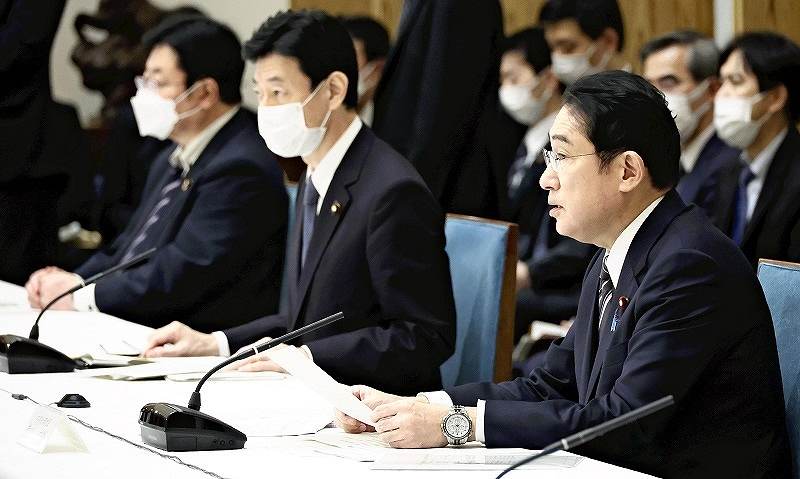
Prime Minister Fumio Kishida addresses a meeting of the Green Transformation Implementation Council at the Prime Minister’s Office on Thursday.
7:00 JST, December 24, 2022
Next-generation nuclear power plants will be constructed and existing reactors will be allowed to operate for longer than the current 60-year limit under a government plan aimed at ensuring stable energy supplies and achieving carbon neutrality.
The basic plan was approved at a meeting of the Green Transformation Implementation Council at the Prime Minister’s Office on Thursday.
The move marks a major shift in a government policy that had not included plans to construct or rebuild nuclear reactors since the March 2011 accident at the Fukushima No. 1 nuclear power plant.
At the meeting of the council, Prime Minister Fumio Kishida said steady efforts were needed to build public and regional confidence so that policies that deal directly with the energy problems Japan is facing can be expedited.
The basic plan states nuclear power will be “used continuously into the future,” describing it as a “baseload energy source” for achieving decarbonization. It also urges the restart of reactors and positions their safe operation as a top priority.
The plan touts the development and construction of next-generation nuclear reactors with improved safety features as replacements for reactors already set to be decommissioned.
The periods during which existing nuclear reactors are shut down for safety inspections and other reasons will be excluded from the reactors’ operational life, effectively allowing them to operate for more than 60 years. However, the current 60-year cap on operations will remain.
The government also plans to raise about ¥20 trillion through new so-called green transformation bonds to be issued from fiscal 2023. The funds will support corporate decarbonization projects with the aim of triggering private investment in such initiatives.
The government aims to realize public and private investment of more than ¥150 trillion in such projects over the next 10 years.
Revenue from a “carbon pricing” system under which companies must pay for the carbon dioxide emissions they produce will be used to redeem the bonds.
The plan also includes efforts to push ahead with the development of infrastructure that will encourage the wider use of fuels such as hydrogen and ammonia, which do not emit carbon dioxide when burned.
The basic plan will be developed into a policy that will help the government achieve its stated goal of zero net emissions of greenhouse gases by 2050.
The Cabinet is expected to formally approve the plan next year. The government will then draw up required legislation among other steps.
Top Articles in Politics
-

Japan PM Takaichi’s Cabinet Resigns en Masse
-

Sanae Takaichi Elected Prime Minister of Japan; Keeps All Cabinet Appointees from Previous Term
-

Japan’s Govt to Submit Road Map for Growth Strategy in March, PM Takaichi to Announce in Upcoming Policy Speech
-

LDP Wins Historic Landslide Victory
-

LDP Wins Landslide Victory, Secures Single-party Majority; Ruling Coalition with JIP Poised to Secure Over 300 seats (UPDATE 1)
JN ACCESS RANKING
-

Producer Behind Pop Group XG Arrested for Cocaine Possession
-

Japan PM Takaichi’s Cabinet Resigns en Masse
-

Japan Institute to Use Domestic Commercial Optical Lattice Clock to Set Japan Standard Time
-

Man Infected with Measles Reportedly Dined at Restaurant in Tokyo Station
-

Israeli Ambassador to Japan Speaks about Japan’s Role in the Reconstruction of Gaza























